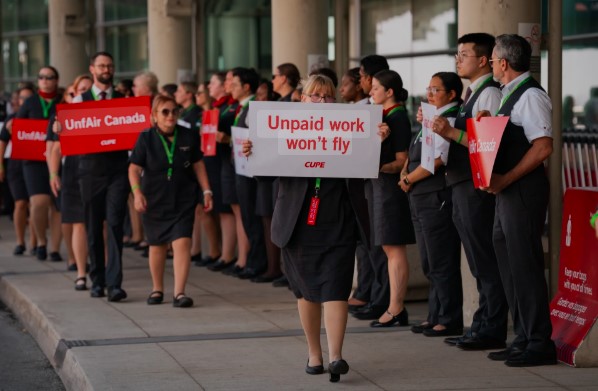On August 16, 2025, Air Canada faced its first major strike since 1985 when about 10,000 flight attendants—members of the Canadian Union of Public Employees (CUPE)—walked off the job. Though the Air Canada strike was disruptive, the action paralyzed almost all Air Canada and Air Canada Rouge flights, with in excess of 130,000 travelers per day facing disruption to their travel itineraries across Canada and abroad.
Why Did The Air Canada Strike happen?
At the heart of the dispute lay two main issues:
- Unpaid Groundwork: Flight attendants have traditionally only been paid while the aircraft is in motion—i.e., not during boarding, while the aircraft is being prepared for flight, or during the deplaning process. CUPE estimates that that amounts to about 35 unpaid hours of work monthly, for every flight attendant.
- Inadequate Pay Increase: Air Canada had offered a 38% total increase in compensation over four years, with a 25% raise in the first year. For CUPE, this was far from sufficient, given soaring rates of inflation. The union contended that rates in the offer table did not meet industrial standards. The union also compared the proposed rates with Air Transat’s starting salaries, which remain far higher.
What Else Went Off on the Ground?
The Controlled Shutdown
On August 13, with a 72-hour Air Canada strike notice issued by CUPE, Air Canada responded with a lockout notice, a calculated staggered wind-down designed to minimize chaos for customers.
The Flight Suspension
Early in the morning on Saturday, August 16, every Air Canada flight had come to a standstill, including those of Air Canada Rouge. Luckily, Air Canada Express Services continued, being operated by both Jazz Aviation and PAL Airlines.
Exodus of Travelers
Strikes at the airports stranded thousands of travelers, and 25,000 Canadians abroad were uncertain about their return.

Governmental Intervention: Binding Arbitration
Jobs Minister Patty Hajdu soon after invoked Section 107 of the Canada Labour Code. A referral of the dispute to the Canada Industrial Relations Board (CIRB) for binding arbitration was given with a view to ending the strike immediately.
- Though said to take 24–48 hours to take full effect, Air Canada warned it could very well take operations 7–10 days to get back to normal.
- CUPE was critical of this, denouncing it as a government victory for the airline, weakening the rights of fair bargaining.
Impact on Travelers and the Economy
What it Means to Travelers:
- There were cancellations of flights, resulting in mass rescheduling, with many travelers struggling to find alternatives.
- Air Canada offered free changes, future credits, or refunds.† However, capacity remains limited due to the midsummer peak.
- Theoretically, no compensation is liable for cancellations caused by labor disruptions. However, rebooking and refunds must still be offered.
Economic Impact:
The strike came amidst ongoing trade tensions with the U.S.
Industries and the Business Council of Canada pressured the government to intervene, warning of bigger economic consequences.
A Timeline Recap
| Date | Event |
|---|---|
| Aug 13 | CUPE issues 72-hour strike notice; Air Canada issues lockout notice. |
| Aug 14–15 | Flights progressively canceled; Air Canada begins wind-down plan. |
| Aug 16 | Full strike begins; nationwide suspension. |
| Aug 16 (hrs later) | Canada orders binding arbitration to halt strike. |
| Next 24–48h | Arbitration expected; operations to gradually resume over a week. |
What to Do If Your Travel Is Disrupted
Monitor Your Flight Status – Keep checking for updates on the Air Canada website or via the Air Canada app to the very last moment before leaving for the airport.
Explore Your Options – Have yourself rebooked, credited with a travel ticket, or refunded—be very clear on what you want.
Document Your Losses – Recovery of travel-related expenses caused by cancellations, may it be through a third party or otherwise.
Stay Patient and Flexible – It may be several days before all services have recovered because the peak travel period is still in full swing.
What’s Next?
- The arbitration decision from CIRB should end the strike within 48 hours.
- Flight operations are expected to begin resuming, though this will take an estimated week to achieve a full ramp-up.
- Keep an eye out for new contract terms, particularly on Groundwork pay and compensation levels.
Final Thoughts On The Air Canada Strike
The Air Canada strike of 2025 stands as a potent reminder of the delicate balance between the protection of fair labor practices and national infrastructure, as well as public convenience. This labor dispute is unfolding; thus, Canadians need to stay informed and maintain empathy toward not only workers who seek fair compensation but also toward the broader economic fallout of such disruptions.





Pingback: Air Canada 2025 Guide | Vacations & Tips | Startup Editor